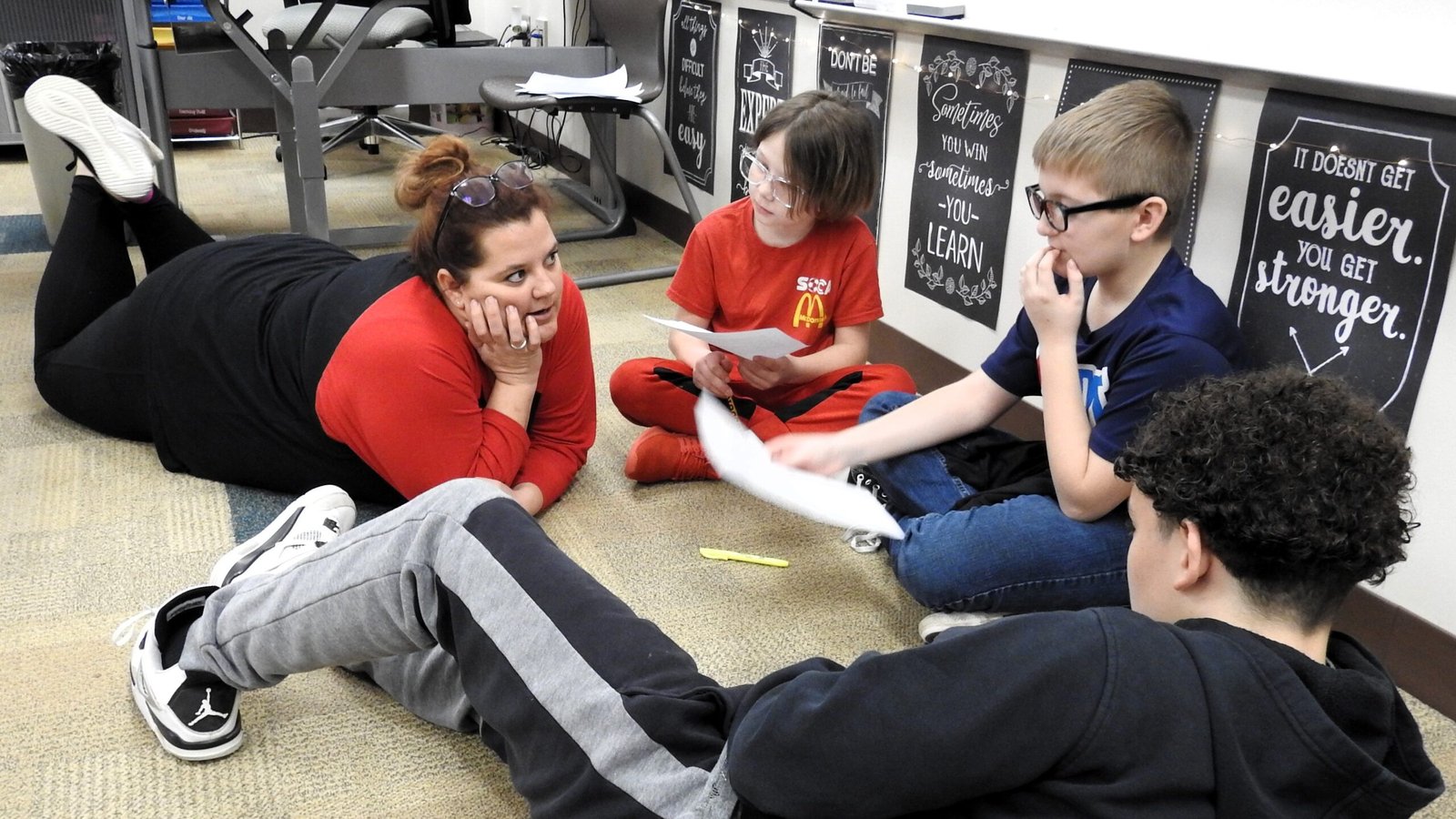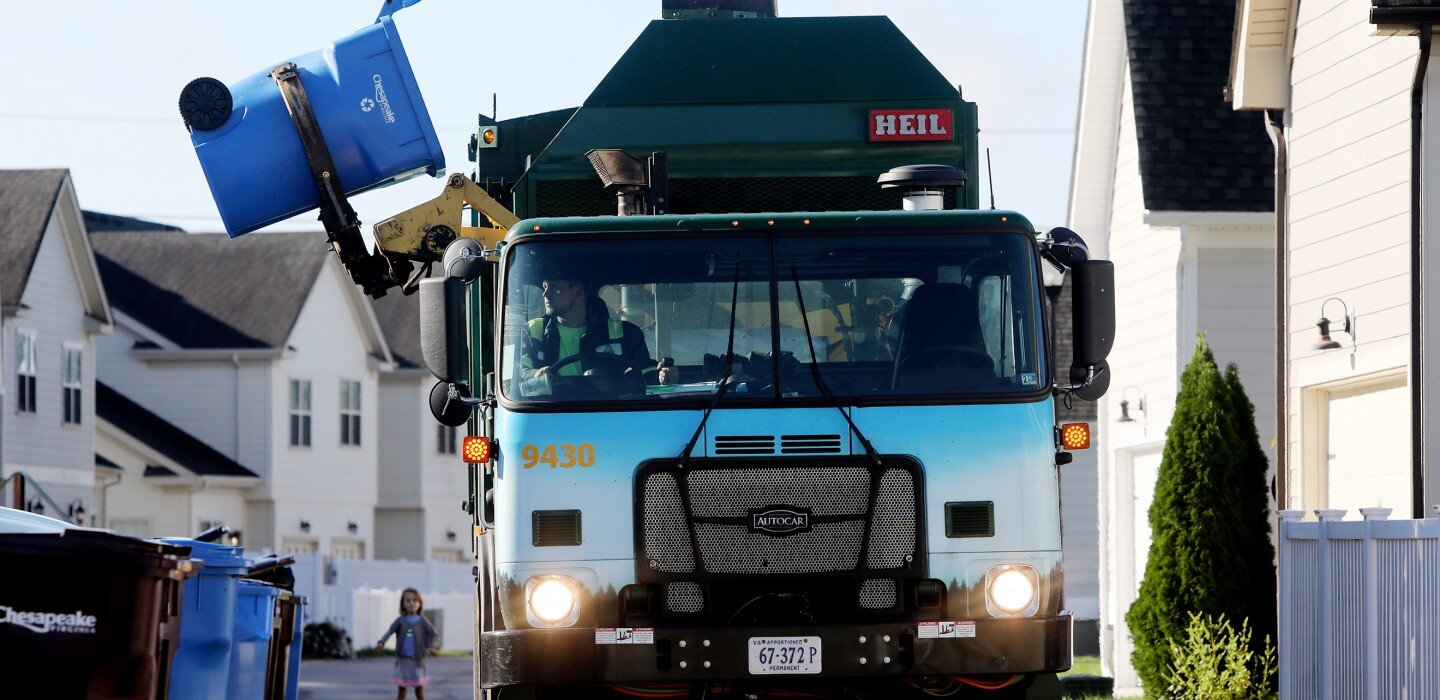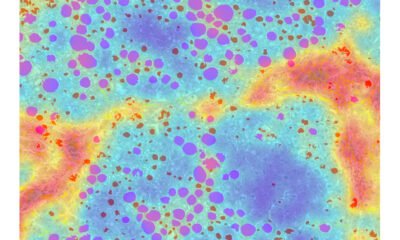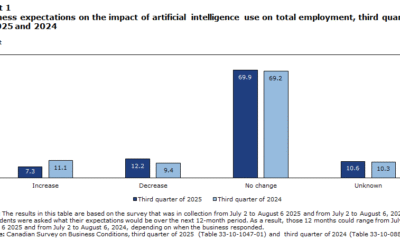AI Research
Parents: Embrace AI, but don’t let it thwart literacy skills

CES uses AI in classrooms
Intervention specialist Samantha Rotruck explains an assignment to sixth-graders at Coshocton Elementary School where she used AI to scale an article for different reading levels.
- Florida has officially recognized AI as a tool for K-12 schools, raising questions about its impact on student literacy.
- While AI can personalize learning and assist teachers, it risks hindering students’ critical thinking if used as a shortcut.
- Educators must teach students to use AI as a supplement for growth rather than a replacement for foundational work.
- Organizations like Teach For America are training educators to leverage AI effectively while prioritizing core literacy skills.
The challenge for educators, parents, and policymakers is clear: AI is the future, and to better prepare the next generation, we must teach students to use AI responsibly as a supplement to their growth, not a crutch. Literacy isn’t just about decoding words. It’s about building minds. And that’s work no algorithm can do for us; students must work those muscles themselves.
Artificial intelligence is already reshaping Florida’s classrooms. With HB 1361 now on the books, AI is officially recognized as a tool to support teaching and learning in K–12 schools. That’s a big shift, and it brings big questions. Most importantly: Is AI strengthening our students’ ability to read, think, and write, or is it quietly getting in the way?
Used well, AI has enormous promise. It can tailor reading materials to a student’s level, provide instant feedback, and make literacy practice more engaging. For struggling readers, that kind of support builds confidence and closes gaps. For teachers, it can take repetitive tasks off their plate, freeing them to connect more deeply with students.
But we must be cautious. When students turn to AI to summarize, generate, or even finish their assignments, they risk skipping the very work literacy requires: grappling with complex texts, thinking critically, and developing stamina. AI can save time, but the danger comes when it saves the wrong kind of time, the formative practice of reading and writing itself.
One solution to closing literacy gaps begins with early exposure at home, targeted interventions at school, and communities supporting access to enrichment programs, tutoring, and positive learning experiences. At the same time, preparing educators to leverage AI wisely is essential.
Teach For America–Florida is one of the leading drivers of this work. In our novice teacher program, we train new educators to use AI not as a replacement for human instruction but as a tool to personalize learning, streamline planning, and give students timely feedback. Teach For America is one of the leading drivers preparing educators to use AI effectively while safeguarding literacy outcomes.
By equipping our corps members and alumni with these strategies, we maximize learning opportunities while ensuring teachers can invest in building strong relationships and delivering rigorous instruction. With more than 5,000 alumni, 150+ school leaders, nearly 100 Teacher of the Year recipients since 2020, and four Florida State Teachers of the Year, our network continues to shape how talent and technology can work together to accelerate student achievement.
AI isn’t inherently good or bad. It’s a tool, and its value depends on how we use it. If we teach students to embrace it as an enhancer of comprehension and engagement, not a replacement for hard work, it can be transformative. But if we let it become a shortcut, we risk weakening the very foundation of lifelong learning.
The path forward is clear. As educators, parents, and community leaders, we must help students treat AI as a companion to their growth, not a crutch. Because literacy isn’t just about decoding words, it’s about building minds. And that kind of strength only comes from doing the work ourselves.
Lakeisha Wells-Palmer leads Teach For America’s efforts as the statewide executive director of Teach For America regions in Florida. With 23 years of experience in education, she serves as a champion for principals, teachers, and students.
JOIN THE CONVERSATION
Send letters to the editor (up to 200 words) or Your Turn columns (about 500 words) to letters@tallahassee.com. Please include your address for verification purposes only, and if you send a Your Turn, also include a photo and 1-2 line bio of yourself. You can also submit anonymous Zing!s at Tallahassee.com/Zing. Submissions are published on a space-available basis. All submissions may be edited for content, clarity and length, and may also be published by any part of the USA TODAY NETWORK.
AI Research
AI, Robotics Could Sort Trash in South Hampton Roads, Va.

(TNS) — Representatives of the region’s waste disposal authority are making the rounds at city meetings this month to lay the groundwork for long-term contract extensions they say will extend use of the regional landfill through the end of the century.
Southeastern Public Service Authority (SPSA) is asking South Hampton Roads cities and counties to renew their trash contracts for 25 years instead of an upcoming 10-year extension.
The longer-term contracts are needed to ensure that SPSA’s third-party provider will invest $200 million in new facilities to sort recyclables from solid waste across the region, SPSA Board of Directors Chairman Tom Leahy told the Virginia Beach City Council Tuesday.
The new sorting process will eventually eliminate the need for blue curbside recycling cans and for residents to sort recyclables from solid waste.
“All the waste would go into a single can, collected by a single truck at the curbside,” said Leahy. “Recycling and reuse would occur after collection.”
SPSA handles hundreds of thousands of tons of waste for Chesapeake, Norfolk, Portsmouth, Suffolk and Virginia Beach, in addition to surrounding localities including Franklin and Southampton and Isle of Wight counties.
SPSA has been in need of alternative waste disposal services since the 2024 closure of the WIN Waste plant, formerly known as the Wheelabrator facility, which burned 80% of the region’s trash for decades. The former plant also converted waste into steam energy for the Norfolk Naval Shipyard. Then, 30% of the ash left over was diverted to the landfill.
The plant’s closure put pressure on the regional landfill, which will reach capacity in a few decades.
SPSA is in the process of finalizing negotiations with Commonwealth Sortation LLC, a subsidiary of AMP Robotics — a Colorado-based alternative waste disposal provider that uses artificial intelligence and robotics to extract mixed recyclables and organic material from municipal solid waste.
The process will divert 50% of SPSA’s waste from the landfill and extend the landfill’s capacity through 2095, Leahy said.
Commonwealth Sortation plans to invest approximately $200 million in new processing facilities, but wants a guarantee that SPSA’s member communities are in for the long haul. The company is currently operating out of a facility in Portsmouth and plans to expand its operations.
An agreement between SPSA’s board and Commonwealth Sortation is expected by the end of this year, but it’s contingent on most of the localities agreeing to the 25-year extension, Leahy said.
The Virginia Beach City Council is scheduled to vote on the contract extension Oct. 7. Cities’ agreements with SPSA are scheduled to renew for an additional 10 years in 2027. The proposed amendment would extend each localities’ contract to June 30, 2052.
“Recycling’s pretty popular with our citizens, and this will make everybody with a black can be a recycler,” said Vice Mayor Rosemary Wilson. “It’s really good news environmentally for all of us.”
Tipping fee increases associated with the new process are not expected to be higher than what large cities like Virginia Beach that offer curbside recycling are already incurring.
“We won’t necessarily see a cost increase associated with this transaction,” said City Manager Patrick Duhaney.
Several cities recently incurred cost increases when they renewed recycling contracts with TFC Recycling, including Virginia Beach and Norfolk. Chesapeake did away with curbside recycling in 2022 as costs increased.
The average number of homes using curbside recycling in Virginia Beach was 125,000 in 2024. Virginia Beach residents currently pay for curbside recycling as part of their trash collection. The solid waste collection fee is $30.55 per month.
Virginia Beach’s contract with TFC Recycling will overlap with the new SPSA contract and general fund support may be needed to cover the cost, City Manager Patrick Duhaney said.
©2025 The Virginian-Pilot. Visit pilotonline.com. Distributed by Tribune Content Agency, LLC.
AI Research
PharmaNest, NIH and VCU Launch Confirmatory Retrospective Outcome Study With 1,765 Patients to Advance AI-Driven Digital Pathology in MASLD

PharmaNest Inc. announced today a multi-institutional research collaboration with Virginia Commonwealth University (VCU) and the National Institutes of Health (NIH) to confirm the prognostic performance of artificial intelligence (AI) powered digital pathology biomarkers in metabolic dysfunction-associated steatotic liver disease (MASLD) in a retrospective cohort of 1,765 patients with MASH (NASH CRN DB2 Cohort)
PRINCETON, N.J., September 11, 2025 (Newswire.com)
–
PharmaNest Inc. announced today a multi-institutional research collaboration with Virginia Commonwealth University (VCU) and the National Institutes of Health (NIH) to confirm the prognostic performance of artificial intelligence (AI) powered digital pathology biomarkers in metabolic dysfunction-associated steatotic liver disease (MASLD) in a retrospective cohort of 1,765 patients with MASH (NASH CRN DB2 Cohort).
The collaboration unites Professor Arun Sanyal, M.D. (Director, Stravitz-Sanyal Institute for Liver Disease and Metabolic Health at VCU), Dr. David Kleiner, M.D., Ph.D. (Principal Investigator, NIH NASH CRN), and Dr. Mathieu Petitjean, Ph.D. (CEO, PharmaNest). Together they will lead the Digital Pathology and AI for Liver Outcomes Study – 2 (DPAILO-2, NCT06493253), an NIH NASH CRN supported ancillary study.
Study Highlights:
Primary Objective: Evaluate the prognostic value of PharmaNest’s FibroNest Ph-FCS biomarker, a high-resolution single-fiber AI-driven fibrosis continuous score, in predicting hepatic decompensation.
Comparative Goals: Compare Ph-FCS against conventional fibrosis staging and some non-invasive tests.
Exploratory Aims: Use single-fiber clustering (FibroMAP) on paired biopsies to uncover novel fibrosis risk phenotypes.
The study uses 1,765 anonymized digital pathology liver biopsies from the NAFLD Adult Database 2, stained with Masson’s Trichrome and scanned at ultra-high resolution. PharmaNest will process the images and generate biomarkers on an accelerated basis to ensure timely results, which will be integrated into a secure VCU-hosted database for statistical analysis.
VCU will oversee governance, NIH compliance, and statistical analyses.
PharmaNest will sponsor, analyze images, and deliver AI-derived biomarkers within the 2025 timeline.
NIH’s NASH CRN will provide clinical oversight and ensure alignment with network standards.
“This collaboration represents an important step toward establishing robust histological biomarkers that can guide patient management and accelerate drug development in MASLD,” said Professor Arun Sanyal, M.D. Principal investigator.
“By combining the depth of NASH CRN’s clinical expertise with PharmaNest’s AI-powered single-fiber pathology and continuous fibrosis scores, we aim to accurately and quantitatively assess fibrosis progress and treatment response, and so provide better information for hepatologists and their patients,” said Dr. David Kleiner, M.D., Ph.D., NIH’s NASH CRN Liaison.
“PharmaNest is proud to bring its FibroNest™ Digital Pathology platform to this partnership. This landmark study will validate the strong prognostic power of our continuous biomarker Ph-FCS-already proven in over 400 patients with more than 10 years of follow-up-paving the way for regulatory-grade digital biomarkers in liver disease and unlocking new discoveries with our FibroMAP™ spatial histology tools.” said Dr. Mathieu Petitjean, Ph.D. CEO at PharmaNest.
About the Partners
The Stravitz-Sanyal Institute for Liver Disease and Metabolic Health at Virginia Commonwealth University (VCU) is dedicated to advancing research, clinical care, and education to improve the prevention, diagnosis, and treatment of liver and metabolic diseases, fostering innovation and collaboration to reduce the global burden of these conditions.
NASH Clinical Research Network (NASH CRN) is an NIH-funded collaborative network advancing research in nonalcoholic fatty liver disease and steatohepatitis.
PharmaNest Inc. is a digital pathology company pioneering AI-driven single-fiber analysis for fibrosis and inflammation in preclinical and clinical studies.
Contact Information
Mathieu Petitjean
CEO
info@pharmanest.com
(609) 375 2003
Source: PHARMANEST
AI Research
Gov. Shapiro Attends Artificial Intelligence Summit in Pittsburgh

“That becomes the backbone for all of the creative genius that exists in this room, for developing the technologies that are going to allow us to grow our economy here in Pennsylvania,” Shapiro said. “Not just for a few years, but really to me, this is a generational change.
-

 Business2 weeks ago
Business2 weeks agoThe Guardian view on Trump and the Fed: independence is no substitute for accountability | Editorial
-
Tools & Platforms1 month ago
Building Trust in Military AI Starts with Opening the Black Box – War on the Rocks
-

 Ethics & Policy2 months ago
Ethics & Policy2 months agoSDAIA Supports Saudi Arabia’s Leadership in Shaping Global AI Ethics, Policy, and Research – وكالة الأنباء السعودية
-

 Events & Conferences4 months ago
Events & Conferences4 months agoJourney to 1000 models: Scaling Instagram’s recommendation system
-

 Jobs & Careers2 months ago
Jobs & Careers2 months agoMumbai-based Perplexity Alternative Has 60k+ Users Without Funding
-

 Podcasts & Talks2 months ago
Podcasts & Talks2 months agoHappy 4th of July! 🎆 Made with Veo 3 in Gemini
-

 Education2 months ago
Education2 months agoMacron says UK and France have duty to tackle illegal migration ‘with humanity, solidarity and firmness’ – UK politics live | Politics
-

 Education2 months ago
Education2 months agoVEX Robotics launches AI-powered classroom robotics system
-

 Funding & Business2 months ago
Funding & Business2 months agoKayak and Expedia race to build AI travel agents that turn social posts into itineraries
-

 Podcasts & Talks2 months ago
Podcasts & Talks2 months agoOpenAI 🤝 @teamganassi



















